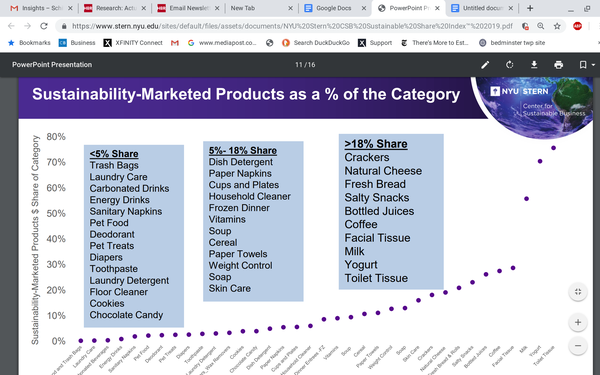
Sustainable consumer products are
helping overall growth in some categories, showing that paying attention to environmental concerns pays off at the cash register.
A study by the New York University Stern Center for
Sustainable Business shows that sustainable products delivered 50.1% of packaged goods market growth from 2013-2018, despite representing only 16.6% of the category. And sales from those kinds of
products grew 5.6 times faster than products not marketed as sustainable, and 3.3 times faster than the overall CPG market.
NYU’s Tensie Whelan and Randi Kronthal-Sacco,
writing in the Harvard Business Review about the study, make the provocative argument that “Consumers are voting with their dollars — against unsustainable brands. The
legacy companies that will thrive are those that accept this shift and are willing to pivot.”
advertisement
advertisement
They praise PepsiCo and Unilever for trying, “despite the strident
objections of investors.”
And they write, “CPGs [manufacturers] that are not making the pivot will lose — Kraft Heinz, whose investors have encouraged a cost-cutting approach that is
backfiring, is a case in point. Given the evidence that consumer tastes are changing, an attitude of ‘Why mess with a recipe that has worked well over the last 40 years?’ is the wrong one
to take.”
Sustainably marketed products have more of an impact in some categories than others, the study says. Toilet tissue, facial tissue, milk, yogurt,
coffee, salty snacks, and bottled juices are areas in which sustainable brands have the highest share in their category, defined in the study as more than 18%.
The Stern
study was helped with data from IRI from bar scan codes at retail checkout in food, drug, dollar, and mass merchandisers, which they say represented 40% of CPG dollar sales from
2013-2018.
The study’s findings aren’t completely new, either. Unilever has touted its "sustainable living plan" since 2010 and has noted the success of its
sustainable brands to shareholders — though, as the study says, not always receiving praise for it. Procter & Gamble’s Ambition 2030 lays out its
sustainability goals.
In 33 of 36 product categories studies, sustainable products outperformed the other kind in sales, if only by a bit. But a long list of
categories still haven’t been changed much by a surge in market share from environmentally marketed products. Those lagging categories include trash bags, laundry care, sanitary napkins,
diapers, toothpaste, cookies and candy and pet food.
Still, “That said, some of those categories saw high growth in sustainability marketed products
— sanitary napkins and laundry care were among the
highest, at 150%,” write Whelan and Randi Kronthal-Sacco,. “So it appears that some categories that are behind in sustainability-marketed product share are making up for lost
time.”